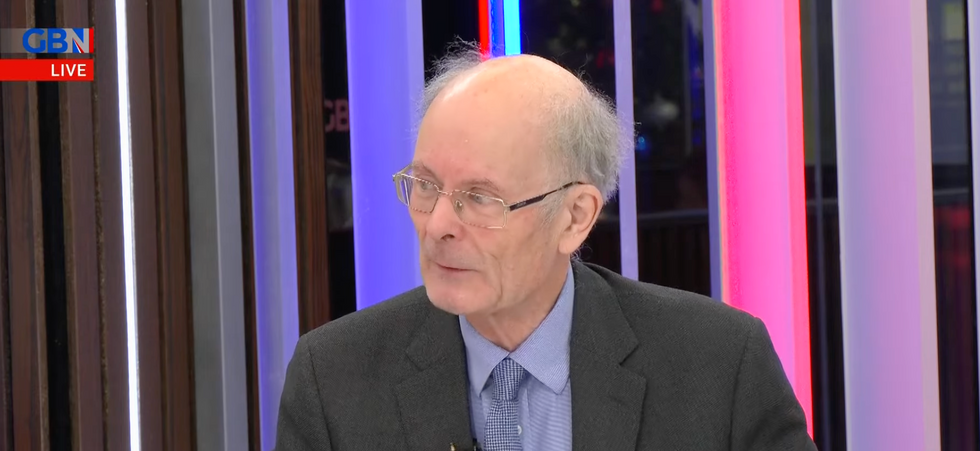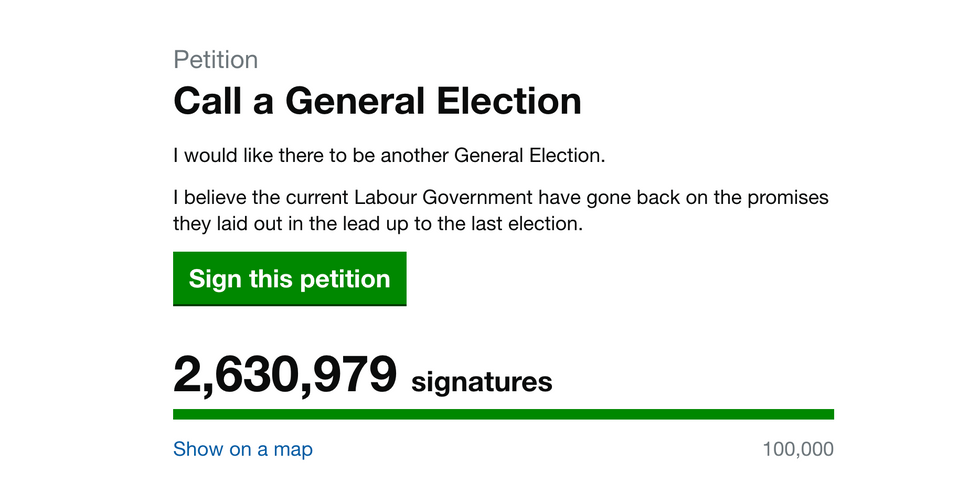More than 2.6 million have signed the petition for a General Election - but what amount will make PM listen?

A pub landlord's online petition calling for another General Election in the United Kingdom has garnered more than 2.6 million signatures and counting. But will it make a blind bit of difference? GB News investigates
Don't Miss
Most Read
Latest
When Michael Hestwood initiated an online petition calling for a General Election last Thursday, he would have been "chuffed" if it garnered 1,000 signatures.
The pub landlord told GB News: “I have never got involved in politics whatsoever and I have never done a petition in my life”, adding: “I just got sick of the lies I was hearing from Labour. I thought, ‘Okay, how do we express ourselves in the correct manner?’"
He initially shared it via WhatsApp with family and friends, but it soon snowballed after getting shared on X and other social media platforms.
It turns out his disaffection is widely felt: at the time of writing, 2,621,900 people have signed the petition.
It speaks to the petition's traction that X owner Elon Musk - an outspoken critic of Starmer - shared it within hours of going live and commented: "Wow."
Starmer had a chaotic first 100 days in office. His handling of the summer riots fuelled the hashtag "Two Tier Kier", which refers to the allegation that he takes a tougher line on white British people with right-leaning views over ethnic minorities and people from the left. The PM vehemently denies this.
Then there was the internal strife sparked by the resignation of Sue Gray, Starmer's chief of staff, after only 93 days, the freebie scandal and the fierce backlash to proposed changes to the winter fuel allowance and the inheritance tax on farmers.
As Starmer's Government lurches from one PR disaster to the next, his polling has nosedived, so it's not entirely surprising that a petition calling for him to step down has gained significant traction.
Will it make a difference?
The UK government is required to issue a response to a petition if it passes 10,000 signatures.
Since the petition zoomed past this threshold in no time, government officials were required to address the petition, typically providing an explanation or justification for their current stance on the issue.
In an interview on ITV's This Morning on Monday, Starmer dismissed the petition, ruling out an early general election.
He said: "There will be plenty of people who didn't want us in the first place... my focus is on the decisions that I have to make every day."
"That isn't how our system works."
Does he have a point?
Yes, the power to call a general election ultimately lies with the Prime Minister. Even with millions of signatures, the PM could choose not to call an election.

It was the last Conservative government that bestowed the PM's right to call an early election, notes John Curtis
|GB News
As elections guru Sir John Curtis rightly pointed out on GB News on Tuesday, it was the last Conservative government that bestowed this constitutional right onto the PM.
The constitutional position under the legislation passed by the last Conservative government, namely the Dissolution and Calling of Parliament Act 2022, gives the Prime Minister the authority to advise the monarch on calling a general election.
This reverts to the traditional practice where the Prime Minister requests the dissolution of Parliament, which can be done at a time of their choosing, provided it adheres to the maximum term limit of five years since Parliament first met.
This act effectively removed the constraints set by the Fixed-term Parliaments Act 2011, which had previously required a super-majority vote or a vote of no confidence to call an early election.
Thus, the timing of general elections within the next five years remains at the discretion of the Prime Minister, barring any significant changes in parliamentary support or constitutional conventions.
However, if a petition reaches this 100,000 signatures, it will be considered for debate in the House of Commons.
This does not guarantee that a debate will occur, but it increases the likelihood. MPs might consider your petition for a debate even before it reaches 100,000 signatures, but at 100,000, the petition almost always gets debated.
Yes, the Commons may throw out debate on the petition as they cannot compel Stamer's Government to call an election. However, it might be "wiser to have the debate than not", says Curtis.
He suggests Starmer's loveless landslide makes a case for debating the motion.
In the 2024 UK general election, Keir Starmer's Labour Party won a significant majority in Parliament with 412 seats out of 650, which translates to a supermajority. However, when looking at the percentage of the voting population, only about 20 per cent of the total eligible voting population supported Labour - a lower percentage than those who voted for Jeremy Corbyn, the last Labour leader.
It was more a protest vote against the Conservative Party, which experienced its worst defeat in nearly two centuries.
Insurgent parties also won big but failed to make a dent due to the first-past-the-post (FPTP) electoral system.
For instance, Reform UK, despite gaining only five seats, managed to secure around 14 per cent of the vote share, indicating a significant portion of the electorate's support for parties outside the traditional two-party system.
This suggests Starmer is presiding over a fragmented Britain, and a debate could be merited to clear up this mess, Curtis suggests.
LATEST MEMBERSHIP DEVELOPMENTS

The message might be debated due to the fragmented nature of Britain and Starmer's shallow victory
|UK Parliament
Outside of these constitutional mechanisms, there's the political message it sends. More than 2.5 million signatures are substantial, indicating significant public backlash.
There's also mention on social media platforms like X about the potential for triggering by-elections if 10 per cent of voters in any constituency sign a petition calling for their MP's removal.
Theoretically, if this were to happen in enough constituencies (327, which would represent over half the seats in the House of Commons), it could result in a situation akin to a general election.
However, this is more speculative and not a typical or formal mechanism for calling a general election.











